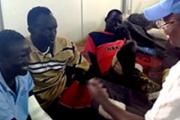WHO ensures wounded in South Sudan get to hospital for life-saving treatment
 More than 2500 people have been injured in the ongoing crisis in South Sudan. WHO is working with partners on the ground to ensure they get the medical care and supplies they need.
More than 2500 people have been injured in the ongoing crisis in South Sudan. WHO is working with partners on the ground to ensure they get the medical care and supplies they need.
As leader of the humanitarian health cluster, WHO supports the evacuation of wounded patients to hospitals where specialist care is available and provides medical supplies and equipment to health partners caring for patients in South Sudan.
“There were 25 patients evacuated from the UNMISS clinic in Bor, where my family had taken me after I was injured in the clashes. One died, 3 were taken to Juba Military Barracks, and 21 of us were brought here,” says Kuol.
“I am so grateful to WHO and the UN for arranging to have me transported here, providing medicine and dressing my wound daily. This is helping me to heal fast. Soon I will be able to go home to my family,” adds Kuol.
Getting patients to hospitals with specialized care
"For each patient, you need gloves, drugs and other materials for dressing. We couldn’t do this without the support of WHO."
Dr Kouassi Rene Kouame, orthopaedic surgeon, UNMISS Level II hospital, South Sudan
Since the start of the crisis in South Sudan on 15 December 2013, WHO has worked closely with the UN Office for the Coordination of Humanitarian Affairs (OCHA), UNMISS and the UN Humanitarian Air Service, supporting partners on the ground to ensure that all patients who need specialized care get evacuated to this hospital in Juba and 12 other hospitals where teams of surgeons from Médecins Sans Frontières, the International Committee of the Red Cross, and UNMISS are providing critical care. In addition, WHO has provided medical supplies and equipment for the care of those wounded during the crisis as well as drugs to treat people with other ailments.
Of the more than 2500 people who have been injured in various locations since the start of the conflict, 120 have been medically evacuated to Juba for specialized care and surgery.
WHO helps surgeons obtain medical supplies

As the crisis in South Sudan continues, WHO has stepped up efforts in early warning and response to ensure that disease threats are detected early. The Organization provides guidelines on how to manage health in emergencies and continues to provide medical supplies and drugs – coordinating with health partners to ensure that services reach people where they are needed most.
This Article is from http://www.who.int/features/2014/south-sudan-medical-care/en/index.html
